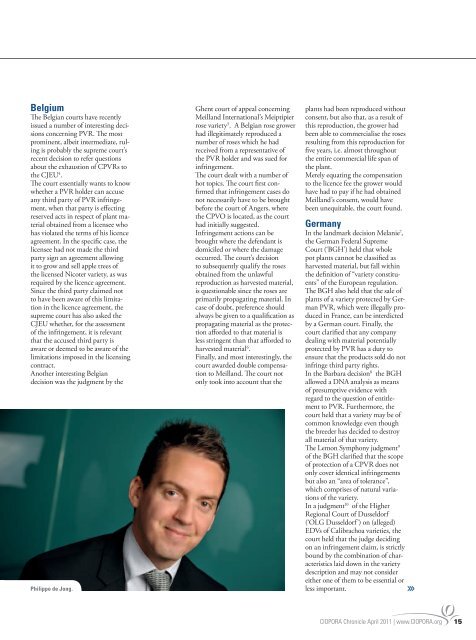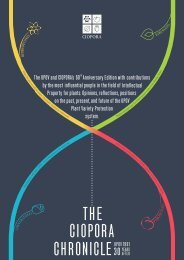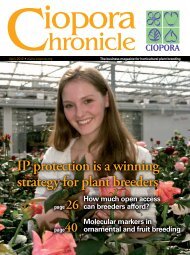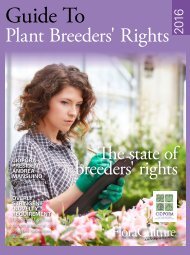2011 CIOPORA Chronicle - the 50th Anniversary Edition
CIOPORA annual magazine on Intellectual Property protection for plant innovations 2011. The magazine was produced in cooperation with FloraCulture International. Read in the 2011 CIOPORA Chronicle edition: - CIOPORA plays vital role in supporting the industry - PVR litigation on the rise - Plant Breeders´Right. Quo vadis? - China deploys national strategy for IPR - CIOPORA helps IP owners protect their rose varieties and much more...
CIOPORA annual magazine on Intellectual Property protection for plant innovations 2011. The magazine was produced in cooperation with FloraCulture International.
Read in the 2011 CIOPORA Chronicle edition:
- CIOPORA plays vital role in supporting the industry
- PVR litigation on the rise
- Plant Breeders´Right. Quo vadis?
- China deploys national strategy for IPR
- CIOPORA helps IP owners protect their rose varieties
and much more...
Create successful ePaper yourself
Turn your PDF publications into a flip-book with our unique Google optimized e-Paper software.
Belgium<br />
The Belgian courts have recently<br />
issued a number of interesting decisions<br />
concerning PVR. The most<br />
prominent, albeit intermediate, ruling<br />
is probably <strong>the</strong> supreme court’s<br />
recent decision to refer questions<br />
about <strong>the</strong> exhaustion of CPVRs to<br />
<strong>the</strong> CJEU 4 .<br />
The court essentially wants to know<br />
whe<strong>the</strong>r a PVR holder can accuse<br />
any third party of PVR infringement,<br />
when that party is effecting<br />
reserved acts in respect of plant material<br />
obtained from a licensee who<br />
has violated <strong>the</strong> terms of his licence<br />
agreement. In <strong>the</strong> specific case, <strong>the</strong><br />
licensee had not made <strong>the</strong> third<br />
party sign an agreement allowing<br />
it to grow and sell apple trees of<br />
<strong>the</strong> licensed Nicoter variety, as was<br />
required by <strong>the</strong> licence agreement.<br />
Since <strong>the</strong> third party claimed not<br />
to have been aware of this limitation<br />
in <strong>the</strong> licence agreement, <strong>the</strong><br />
supreme court has also asked <strong>the</strong><br />
CJEU whe<strong>the</strong>r, for <strong>the</strong> assessment<br />
of <strong>the</strong> infringement, it is relevant<br />
that <strong>the</strong> accused third party is<br />
aware or deemed to be aware of <strong>the</strong><br />
limitations imposed in <strong>the</strong> licensing<br />
contract.<br />
Ano<strong>the</strong>r interesting Belgian<br />
decision was <strong>the</strong> judgment by <strong>the</strong><br />
Ghent court of appeal concerning<br />
Meilland International’s Meiptipier<br />
rose variety 5 . A Belgian rose grower<br />
had illegitimately reproduced a<br />
number of roses which he had<br />
received from a representative of<br />
<strong>the</strong> PVR holder and was sued for<br />
infringement.<br />
The court dealt with a number of<br />
hot topics. The court first confirmed<br />
that infringement cases do<br />
not necessarily have to be brought<br />
before <strong>the</strong> court of Angers, where<br />
<strong>the</strong> CPVO is located, as <strong>the</strong> court<br />
had initially suggested.<br />
Infringement actions can be<br />
brought where <strong>the</strong> defendant is<br />
domiciled or where <strong>the</strong> damage<br />
occurred. The court’s decision<br />
to subsequently qualify <strong>the</strong> roses<br />
obtained from <strong>the</strong> unlawful<br />
reproduction as harvested material,<br />
is questionable since <strong>the</strong> roses are<br />
primarily propagating material. In<br />
case of doubt, preference should<br />
always be given to a qualification as<br />
propagating material as <strong>the</strong> protection<br />
afforded to that material is<br />
less stringent than that afforded to<br />
harvested material 6 .<br />
Finally, and most interestingly, <strong>the</strong><br />
court awarded double compensation<br />
to Meilland. The court not<br />
only took into account that <strong>the</strong><br />
plants had been reproduced without<br />
consent, but also that, as a result of<br />
this reproduction, <strong>the</strong> grower had<br />
been able to commercialise <strong>the</strong> roses<br />
resulting from this reproduction for<br />
five years, i.e. almost throughout<br />
<strong>the</strong> entire commercial life span of<br />
<strong>the</strong> plant.<br />
Merely equating <strong>the</strong> compensation<br />
to <strong>the</strong> licence fee <strong>the</strong> grower would<br />
have had to pay if he had obtained<br />
Meilland’s consent, would have<br />
been unequitable, <strong>the</strong> court found.<br />
Germany<br />
In <strong>the</strong> landmark decision Melanie 7 ,<br />
<strong>the</strong> German Federal Supreme<br />
Court (‘BGH’) held that whole<br />
pot plants cannot be classified as<br />
harvested material, but fall within<br />
<strong>the</strong> definition of “variety constituents”<br />
of <strong>the</strong> European regulation.<br />
The BGH also held that <strong>the</strong> sale of<br />
plants of a variety protected by German<br />
PVR, which were illegally produced<br />
in France, can be interdicted<br />
by a German court. Finally, <strong>the</strong><br />
court clarified that any company<br />
dealing with material potentially<br />
protected by PVR has a duty to<br />
ensure that <strong>the</strong> products sold do not<br />
infringe third party rights.<br />
In <strong>the</strong> Barbara decision 8 <strong>the</strong> BGH<br />
allowed a DNA analysis as means<br />
of presumptive evidence with<br />
regard to <strong>the</strong> question of entitlement<br />
to PVR. Fur<strong>the</strong>rmore, <strong>the</strong><br />
court held that a variety may be of<br />
common knowledge even though<br />
<strong>the</strong> breeder has decided to destroy<br />
all material of that variety.<br />
The Lemon Symphony judgment 9<br />
of <strong>the</strong> BGH clarified that <strong>the</strong> scope<br />
of protection of a CPVR does not<br />
only cover identical infringements<br />
but also an “area of tolerance”,<br />
which comprises of natural variations<br />
of <strong>the</strong> variety.<br />
In a judgment 10 of <strong>the</strong> Higher<br />
Regional Court of Dusseldorf<br />
(‘OLG Dusseldorf’) on (alleged)<br />
EDVs of Calibrachoa varieties, <strong>the</strong><br />
court held that <strong>the</strong> judge deciding<br />
on an infringement claim, is strictly<br />
bound by <strong>the</strong> combination of characteristics<br />
laid down in <strong>the</strong> variety<br />
description and may not consider<br />
ei<strong>the</strong>r one of <strong>the</strong>m to be essential or<br />
less important.<br />
Philippe de Jong. >>><br />
<strong>CIOPORA</strong> <strong>Chronicle</strong> April <strong>2011</strong> | www.<strong>CIOPORA</strong>.org 15









